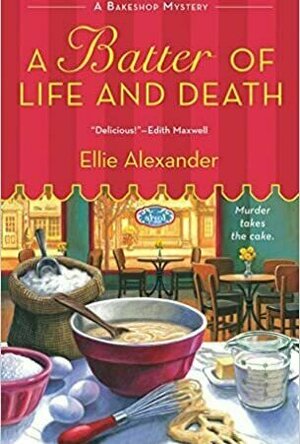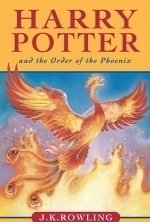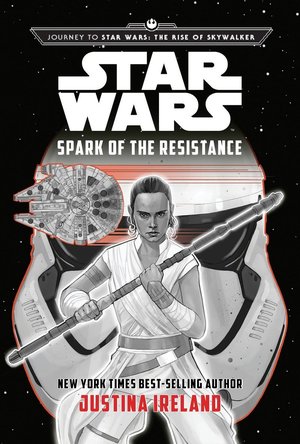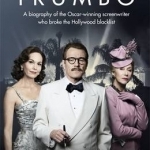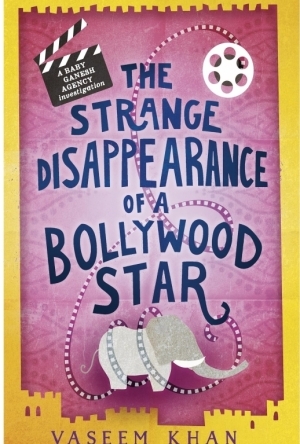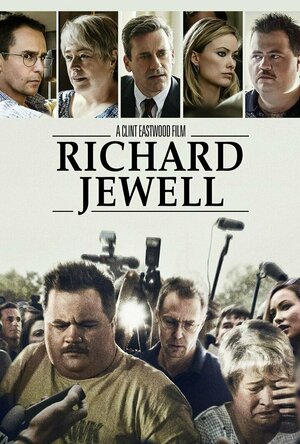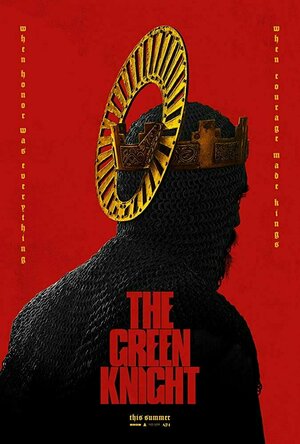Search
Search results

Architecture's Pretexts: Spaces of Translation
Book
The aim of this book is to expose readers to architecture's pretexts that include literary...
Mark @ Carstairs Considers (2478 KP) rated A Batter of Life and Death in Books
Jan 15, 2021
Murderous Contest
It’s autumn, which means that tourist season is winding down in Ashland, Oregon. Fortunately, The Pastry Channel has come to town to film the newest season of Take the Cake. They’ve asked Jules Capshaw to use Torte’s kitchen as a location some of the contestants use to prepare their pastries. Then they ask Jules to be a last-minute contestant. She’s thrilled until she finds Chef Marco, one of the other contestants, dead before the first day of filming. Since she is part of the show, she can’t help but learn things about her fellow contestants. Can she figure out which one is a killer?
It’s been too long since I read the first book in the series, but I was quickly back in Jules’s world with this fun second in the series. The pacing was a bit off at times, but overall there is an enjoyable mystery with plenty of secrets for Jules to uncover. The suspects are good and do their part to keep us guessing. Jules has some personal stuff she is trying to work through, and I enjoyed seeing the growth in her here. This book really made me want to visit Ashland at some point in the future. We get seven recipes at the end for a wide variety of things. It’s easy to see why this series is so popular. I need to pick up the next soon.
It’s been too long since I read the first book in the series, but I was quickly back in Jules’s world with this fun second in the series. The pacing was a bit off at times, but overall there is an enjoyable mystery with plenty of secrets for Jules to uncover. The suspects are good and do their part to keep us guessing. Jules has some personal stuff she is trying to work through, and I enjoyed seeing the growth in her here. This book really made me want to visit Ashland at some point in the future. We get seven recipes at the end for a wide variety of things. It’s easy to see why this series is so popular. I need to pick up the next soon.
Gilbert (11 KP) rated Harry Potter and the Order of the Phoenix in Books
Sep 1, 2017
Harry Potter - never will be another series Like this One!
Since the craze of Harry Potter fandom began with the books and streamlined along with the movie franchise, I was crazy about Harry Potter myself. I always pre-order the books as soon as they came out. I even went to a Harry Potter event at Borders in the OC. It was fun! I read all the books in the series and along with the films, I looked forward to the new one as they came out. Sadly, the franchise has ended. Once that book on the play came out, I grabbed that one too. Harry Potter will always be part of my life because I followed it as it came in book and film form. The first one was amazing and the movie was just perfect.
Erika (17789 KP) rated Spark of the Resistance (Journey to Star Wars: The Rise of Skywalker) in Books
Nov 4, 2019
This middle-grade novel is the first released as part of the 'Journey to the Rise of Skywalker' series of books.
The story features Poe, BB-8, Rey, and Rose. Rose, by far, was the worst part IMO, but, I can't stand her useless character at ALL. I wish the character would have been Finn instead.
This crew is gathering supplies for the fledgling Resistance, when they receive a distress call from a remote planet. They have short adventure, thwarting the First Order, and, of course, recruiting more people to the Resistance. Time will tell if this was a necessary read after seeing the film.
The best part of the book was how thirsty the First Order is for Poe. At one point, a First Order officer remarks that they'd know that magnificent Poe Dameron hair anywhere. It was hilarious, and my favorite part of the entire book.
The story features Poe, BB-8, Rey, and Rose. Rose, by far, was the worst part IMO, but, I can't stand her useless character at ALL. I wish the character would have been Finn instead.
This crew is gathering supplies for the fledgling Resistance, when they receive a distress call from a remote planet. They have short adventure, thwarting the First Order, and, of course, recruiting more people to the Resistance. Time will tell if this was a necessary read after seeing the film.
The best part of the book was how thirsty the First Order is for Poe. At one point, a First Order officer remarks that they'd know that magnificent Poe Dameron hair anywhere. It was hilarious, and my favorite part of the entire book.

Digital Compositing for Film and Video: Production Workflows and Techniques
Book
Written by senior compositor, technical director and master trainer Steve Wright, this book...
My rating: 3.5
<i>I received this book for free through Goodreads First Reads.</i>
Nominated for an Oscar, BAFTA and Golden Globe, <i>Trumbo</i> is a recent film based on the original biography <i>Dalton Trumbo</i> written by Bruce Cook in 1977. Its adaptation to film provided the perfect opportunity to republish this extremely well researched book. With a forward written by John McNamara, the screenwriter of the motion picture, the story of Dalton Trumbo’s life is just as intriguing as it was almost forty years ago. But who is Trumbo?
If, like me, you have never heard of Trumbo or even the infamous “Hollywood Ten,” it may take a while for it to become clear as to why it was worth Cook’s time to produce a book about the man. Dalton Trumbo was a well-known screenwriter of films such as <i>Papillon, Lonely Are The Brave</i> and <i>Roman Holiday</i> as well as author of the novel <i>Johnny Got His Gun</i>. However these are not all he is famous for. During his life, Trumbo became a member of the Communist Party, which Hollywood branded as an Un-American Activity and thus blacklisted him, as well as other screenwriters, directors and actors. Ten of these men, Trumbo included, were imprisoned for their political beliefs – yet nothing prevented Trumbo from continuing his fairly successful career.
Interestingly, Cook begins the book with the final stages of Trumbo’s life. At time of writing Trumbo was still alive, although rather poorly. After contracting lung cancer, having a lung removed, and suffering a heart attack, Trumbo was a very sick man; nonetheless he was still enthusiastic about being interviewed and telling his personal story.
From his childhood, to his evening shifts at a bakery, Cook details Trumbo’s early life, emphasizing the hard upbringing he had before he found himself in the world of Hollywood. Although roughly 75% of the book focuses on Trumbo’s career, Cook highlights Trumbo as a family man, with both a wife and three children who he absolutely adores.
Cook constantly refers to the Hollywood Ten as a concept that the reader should already be familiar with. Granted, someone who picks up this book is more likely to do so having a prior interest in the central figure, and thus already know about his background; however those ignorant on the topic eventually gather a better understanding on the topic once reaching the relevant chapters. It also becomes clearer why Trumbo is worth reading/writing about – he may have been blacklisted, but he managed to break through all the barriers and reinstate his name and many others.
Reading this half a century after the event, it seems strange that Trumbo was imprisoned. He had not done anything intrinsically wrong, it was purely prejudice against his political beliefs that got him into the mess he found himself. But when you consider the events of the time: World War Two, the Cold War, the Korean War, and Vietnam; it is understandable why many feared those who claimed to be Communists.
Cook’s narrative does not flow as a story, and much of it is broken up with quotes from various people he interviewed. The timeline jumps about between past and present (1970s), which occasionally gets a bit confusing. A large part of the book is spent analyzing many of Trumbo’s works – both for screen and written formats – which, unless you have a particular interest, can be a little tedious.
It has got to be said that Bruce Cook was an exemplary writer with a great eye for detail. He did not jump to conclusions or only talk about things from his point of view. Instead he interviewed, what seems like, everyone who ever met Trumbo, and based his writing on fact backed up with numerous quotes and citations.
This edition of <i>Trumbo</i> contains a selection of photographs taken on the set of the movie. Disappointingly it does not contain any of Trumbo himself – you would think that some photos could have been tracked down!
<i>Trumbo</i> is not a book that will interest everyone. Most people today – particularly in England – will probably be unaware of who Dalton Trumbo was, and thus would only seek out this publication due to a fascination with film production. I have not seen the film, but after reading this and discovering how books go from novels, to screenplays to moving image, it would be interesting to find out which parts of Trumbo’s life made it onto the big screen.
<i>I received this book for free through Goodreads First Reads.</i>
Nominated for an Oscar, BAFTA and Golden Globe, <i>Trumbo</i> is a recent film based on the original biography <i>Dalton Trumbo</i> written by Bruce Cook in 1977. Its adaptation to film provided the perfect opportunity to republish this extremely well researched book. With a forward written by John McNamara, the screenwriter of the motion picture, the story of Dalton Trumbo’s life is just as intriguing as it was almost forty years ago. But who is Trumbo?
If, like me, you have never heard of Trumbo or even the infamous “Hollywood Ten,” it may take a while for it to become clear as to why it was worth Cook’s time to produce a book about the man. Dalton Trumbo was a well-known screenwriter of films such as <i>Papillon, Lonely Are The Brave</i> and <i>Roman Holiday</i> as well as author of the novel <i>Johnny Got His Gun</i>. However these are not all he is famous for. During his life, Trumbo became a member of the Communist Party, which Hollywood branded as an Un-American Activity and thus blacklisted him, as well as other screenwriters, directors and actors. Ten of these men, Trumbo included, were imprisoned for their political beliefs – yet nothing prevented Trumbo from continuing his fairly successful career.
Interestingly, Cook begins the book with the final stages of Trumbo’s life. At time of writing Trumbo was still alive, although rather poorly. After contracting lung cancer, having a lung removed, and suffering a heart attack, Trumbo was a very sick man; nonetheless he was still enthusiastic about being interviewed and telling his personal story.
From his childhood, to his evening shifts at a bakery, Cook details Trumbo’s early life, emphasizing the hard upbringing he had before he found himself in the world of Hollywood. Although roughly 75% of the book focuses on Trumbo’s career, Cook highlights Trumbo as a family man, with both a wife and three children who he absolutely adores.
Cook constantly refers to the Hollywood Ten as a concept that the reader should already be familiar with. Granted, someone who picks up this book is more likely to do so having a prior interest in the central figure, and thus already know about his background; however those ignorant on the topic eventually gather a better understanding on the topic once reaching the relevant chapters. It also becomes clearer why Trumbo is worth reading/writing about – he may have been blacklisted, but he managed to break through all the barriers and reinstate his name and many others.
Reading this half a century after the event, it seems strange that Trumbo was imprisoned. He had not done anything intrinsically wrong, it was purely prejudice against his political beliefs that got him into the mess he found himself. But when you consider the events of the time: World War Two, the Cold War, the Korean War, and Vietnam; it is understandable why many feared those who claimed to be Communists.
Cook’s narrative does not flow as a story, and much of it is broken up with quotes from various people he interviewed. The timeline jumps about between past and present (1970s), which occasionally gets a bit confusing. A large part of the book is spent analyzing many of Trumbo’s works – both for screen and written formats – which, unless you have a particular interest, can be a little tedious.
It has got to be said that Bruce Cook was an exemplary writer with a great eye for detail. He did not jump to conclusions or only talk about things from his point of view. Instead he interviewed, what seems like, everyone who ever met Trumbo, and based his writing on fact backed up with numerous quotes and citations.
This edition of <i>Trumbo</i> contains a selection of photographs taken on the set of the movie. Disappointingly it does not contain any of Trumbo himself – you would think that some photos could have been tracked down!
<i>Trumbo</i> is not a book that will interest everyone. Most people today – particularly in England – will probably be unaware of who Dalton Trumbo was, and thus would only seek out this publication due to a fascination with film production. I have not seen the film, but after reading this and discovering how books go from novels, to screenplays to moving image, it would be interesting to find out which parts of Trumbo’s life made it onto the big screen.
Mayhawke (97 KP) rated The Strange Disappearance of a Bollywood Star in Books
Feb 13, 2018
Kahn is establishing himself as a solid and reliable voice in cosy crime
Vaseem Khan is still a relatively new voice in cozy crime fiction, but I have been with him since the start, and on current showing I shall be with him long into the future.
One of the great pleasures for crime fiction readers of the last decade has been the influx of new voices as - in the search for something new and different - the British market has been opened up to translations from abroad (Camilleri, Akunin, Vargas) and English-language fiction set in different cultural environments (No.1 Ladies Detective Agency, Aurelio Zen, Dr. Siri Paboun). Khan has proven himself a skillful and delightful contributor to the latter category, lifting the vibrant sounds, colours, smells and characters of India (good and bad) from the page as he weaves remarkably clever and entertaining stories of brutal thefts, murder and abduction for the protagonist, Inspector Chopra (Retd) & and his mystical and cheeky four-legged sidekick, Ganesha, to unravel.
His latest book sees a young and arrogant Bollywood star abducted on the eve of his most important film shoot to date. As the biggest and most expensive film in Bollywood history grinds to a halt money, reputations and lives are on the line and Chopra is employed to quietly find and return the prodigal starlet to his duties. It quickly becomes apparent, though, that the boy has not just had a Bieberesque tantrum, and that the funding for, and personalities behind the movie may be a lot murkier and more complex than they seem.
Already on his third book in two years he promises to be as prolific as he is enjoyable.
One of the great pleasures for crime fiction readers of the last decade has been the influx of new voices as - in the search for something new and different - the British market has been opened up to translations from abroad (Camilleri, Akunin, Vargas) and English-language fiction set in different cultural environments (No.1 Ladies Detective Agency, Aurelio Zen, Dr. Siri Paboun). Khan has proven himself a skillful and delightful contributor to the latter category, lifting the vibrant sounds, colours, smells and characters of India (good and bad) from the page as he weaves remarkably clever and entertaining stories of brutal thefts, murder and abduction for the protagonist, Inspector Chopra (Retd) & and his mystical and cheeky four-legged sidekick, Ganesha, to unravel.
His latest book sees a young and arrogant Bollywood star abducted on the eve of his most important film shoot to date. As the biggest and most expensive film in Bollywood history grinds to a halt money, reputations and lives are on the line and Chopra is employed to quietly find and return the prodigal starlet to his duties. It quickly becomes apparent, though, that the boy has not just had a Bieberesque tantrum, and that the funding for, and personalities behind the movie may be a lot murkier and more complex than they seem.
Already on his third book in two years he promises to be as prolific as he is enjoyable.
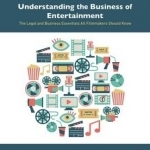
Understanding the Business of Entertainment: The Legal and Business Essentials All Filmmakers Should Know
Book
Understanding the Business of Entertainment: The Legal and Business Essentials All Filmmakers Should...
JT (287 KP) rated Richard Jewell (2019) in Movies
Mar 10, 2020
Richard Jewell (Paul Walter Hauser) is a softly spoken, overzealous university campus security guard whose heart is in the right place and is dedicated to his job – maybe a little too much.
When he discovers a backpack containing a pipe bomb at a celebratory music concert at the 1996 Summer Olympics in Atlanta, his quick thinking saves countless lives. Unfortunately for Richard, he becomes the prime suspect in the investigation and with it, his life is turned upside down as he’s thrust into the media spotlight.
Directed by Clint Eastwood Richard Jewell follows in similar vein to films like American Sniper and The 15:17 to Paris where the central characters struggle with the media attention they receive in the aftermath of events.
The scene during the concert is recreated with meticulous precision and attention to detail and there is genuine tension as you realise that at any point the bomb is going to explode. The investigation is led by FBI agent Tom Shaw (Jon Hamm) who with little to go on places Richard in the spotlight and will stop at nothing to prove his guilt, using every trick in the book to get Richard to confess.
Atlanta Journal-Constitution journalist Kathy Scruggs played by Olivia Wilde was portrayed unfairly for implying that she traded sex for stories. Having died in 2001 she was not around to defend herself, which is a black mark for Eastwood on an otherwise very well directed film.
The journal ran the story much to the delight of Scruggs, but it painted Jewell as the villain causing considerable pain to him and his mother Bobi (Kathy Bates) who delivers another acting masterclass in her supporting role. Scruggs realised her error later on but it was too little too late as the damage to Jewell’s reputation had already been done.
One of the highlights of the film is the relationship between Richard and attorney Watson Bryant (Sam Rockwell). It’s very heartwarming as Watson stood by him until the end even right up to the point of passing on that the real bomber, Eric Rudolph, had confessed to the crime. Richard Jewell is not a gripping film outside of the first half but it’s a powerful watch heightened by excellent acting.
When he discovers a backpack containing a pipe bomb at a celebratory music concert at the 1996 Summer Olympics in Atlanta, his quick thinking saves countless lives. Unfortunately for Richard, he becomes the prime suspect in the investigation and with it, his life is turned upside down as he’s thrust into the media spotlight.
Directed by Clint Eastwood Richard Jewell follows in similar vein to films like American Sniper and The 15:17 to Paris where the central characters struggle with the media attention they receive in the aftermath of events.
The scene during the concert is recreated with meticulous precision and attention to detail and there is genuine tension as you realise that at any point the bomb is going to explode. The investigation is led by FBI agent Tom Shaw (Jon Hamm) who with little to go on places Richard in the spotlight and will stop at nothing to prove his guilt, using every trick in the book to get Richard to confess.
Atlanta Journal-Constitution journalist Kathy Scruggs played by Olivia Wilde was portrayed unfairly for implying that she traded sex for stories. Having died in 2001 she was not around to defend herself, which is a black mark for Eastwood on an otherwise very well directed film.
The journal ran the story much to the delight of Scruggs, but it painted Jewell as the villain causing considerable pain to him and his mother Bobi (Kathy Bates) who delivers another acting masterclass in her supporting role. Scruggs realised her error later on but it was too little too late as the damage to Jewell’s reputation had already been done.
One of the highlights of the film is the relationship between Richard and attorney Watson Bryant (Sam Rockwell). It’s very heartwarming as Watson stood by him until the end even right up to the point of passing on that the real bomber, Eric Rudolph, had confessed to the crime. Richard Jewell is not a gripping film outside of the first half but it’s a powerful watch heightened by excellent acting.
Erika (17789 KP) rated The Green Knight (2020) in Movies
Aug 2, 2021
Green Knight, based upon the poem, Sir Gawain and the Green Knight, does the poem justice. We join our relatively pure-hearted Sir Gawain (Dev Patel) on Christmas morning, as he wakes up in what appears to be a brothel. He rushes home to his Mother (Sarita Choudhury), to change for the Christmas Day feast with the aged King (Sean Harris). Mother is left behind as Gawain goes to the feast, and conjures the appearance of the Green Knight.
Gawain agrees to the Christmas game proposed by the Green Knight, so he can be knighted himself. The game is the same as the poem, a knight gives a blow to the Green Knight, and a year from that date, the knight will visit the Green Chapel so he can return the favor.
The year passes, and Gawain sets out on his quest. Mother gives him the gift of a green sash, that will protect him as he faces the journey and the Green Knight. He sets off on his trippy journey, encountering a scavenger (Barry Keoghan) along the way and is quickly delayed in his quest and left for dead, losing his green sash. After freeing himself, he sets out on his allegory-filled quest again, encountering St. Winifred (Erin Kellyman), giants, and is led by a fox to a castle near the Green Chapel.
The castle is where the film gets back on track with the poem. The Lord (Joel Egerton) shows kindness and hospitality, while his wife (Alicia Vikander), takes the role as temptress. Alicia Vikander plays both the Lady, and the prostitute that Gawain is in love with back home. It’s understandably confusing for Gawain. The same deal is struck between the Lord and Gawain, while the Lord is away on the hunt, he will give Gawain everything he catches, while Gawain promises to give the Lord anything he receives at the castle. Gawain does not end up keeping the agreement as he’s seduced by the Lady and gets the green sash back. He escapes the castle and goes to the Green Chapel to finish the Christmas game. The end was very interesting, would Gawain choose to be courageous and maintain his honor, accepting death? Or would he be a coward, running away to be knighted, then subsequently become King? The ending was scary good.
My first thought after the film ended was that we finally got a film that did an Arthurian legend justice. I happened to be really into Arthuriana, so this film was such a treat. Though, I am left with some questions. I’m not sure which sister Mother was supposed to be. Was Mother Morgaine or Morgause? I assume it was Morgause, but Mother was a little more witchy, so maybe Morgaine? I also don’t know if in the film, the Green Knight was the Lord. The characters were played by two different actors, but the Lord is definitely supposed to be the Green Knight.
Another thing I did like is that I don’t believe they ever called the King by his name, Arthur. This was a smart move, as the story was centralized on Sir Gawain, and not about Arthur and his Knights of the Round Table.
The one sore thumb for me was Alicia Vikander. Her accent when she was the prostitute, Essel, was horrid. I also think that character wasn’t really needed at all because she was just annoying. The whole brothel situation itself was kind of lame because Gawain was supposed to be pure and innocent. The innocence being lost at the Castle was a major part of the poem.
Dev Patel was excellent as Gawain; I was entranced by him, and he kept my attention the entire film. I know there were grumblings about his casting, but seriously, this is a fantasy story. It also is not impossible for people of a different race to be present all over Europe. There once was this empire called Rome, that encompassed a very large area, and enabled people to travel around and settle in areas.
I had been looking forward to this film since March of 2020, and it completely delivered. I hope we get more films like this, rather than the barrage of big dumb action and comic book films. I can’t wait to go see this film again!
Gawain agrees to the Christmas game proposed by the Green Knight, so he can be knighted himself. The game is the same as the poem, a knight gives a blow to the Green Knight, and a year from that date, the knight will visit the Green Chapel so he can return the favor.
The year passes, and Gawain sets out on his quest. Mother gives him the gift of a green sash, that will protect him as he faces the journey and the Green Knight. He sets off on his trippy journey, encountering a scavenger (Barry Keoghan) along the way and is quickly delayed in his quest and left for dead, losing his green sash. After freeing himself, he sets out on his allegory-filled quest again, encountering St. Winifred (Erin Kellyman), giants, and is led by a fox to a castle near the Green Chapel.
The castle is where the film gets back on track with the poem. The Lord (Joel Egerton) shows kindness and hospitality, while his wife (Alicia Vikander), takes the role as temptress. Alicia Vikander plays both the Lady, and the prostitute that Gawain is in love with back home. It’s understandably confusing for Gawain. The same deal is struck between the Lord and Gawain, while the Lord is away on the hunt, he will give Gawain everything he catches, while Gawain promises to give the Lord anything he receives at the castle. Gawain does not end up keeping the agreement as he’s seduced by the Lady and gets the green sash back. He escapes the castle and goes to the Green Chapel to finish the Christmas game. The end was very interesting, would Gawain choose to be courageous and maintain his honor, accepting death? Or would he be a coward, running away to be knighted, then subsequently become King? The ending was scary good.
My first thought after the film ended was that we finally got a film that did an Arthurian legend justice. I happened to be really into Arthuriana, so this film was such a treat. Though, I am left with some questions. I’m not sure which sister Mother was supposed to be. Was Mother Morgaine or Morgause? I assume it was Morgause, but Mother was a little more witchy, so maybe Morgaine? I also don’t know if in the film, the Green Knight was the Lord. The characters were played by two different actors, but the Lord is definitely supposed to be the Green Knight.
Another thing I did like is that I don’t believe they ever called the King by his name, Arthur. This was a smart move, as the story was centralized on Sir Gawain, and not about Arthur and his Knights of the Round Table.
The one sore thumb for me was Alicia Vikander. Her accent when she was the prostitute, Essel, was horrid. I also think that character wasn’t really needed at all because she was just annoying. The whole brothel situation itself was kind of lame because Gawain was supposed to be pure and innocent. The innocence being lost at the Castle was a major part of the poem.
Dev Patel was excellent as Gawain; I was entranced by him, and he kept my attention the entire film. I know there were grumblings about his casting, but seriously, this is a fantasy story. It also is not impossible for people of a different race to be present all over Europe. There once was this empire called Rome, that encompassed a very large area, and enabled people to travel around and settle in areas.
I had been looking forward to this film since March of 2020, and it completely delivered. I hope we get more films like this, rather than the barrage of big dumb action and comic book films. I can’t wait to go see this film again!
